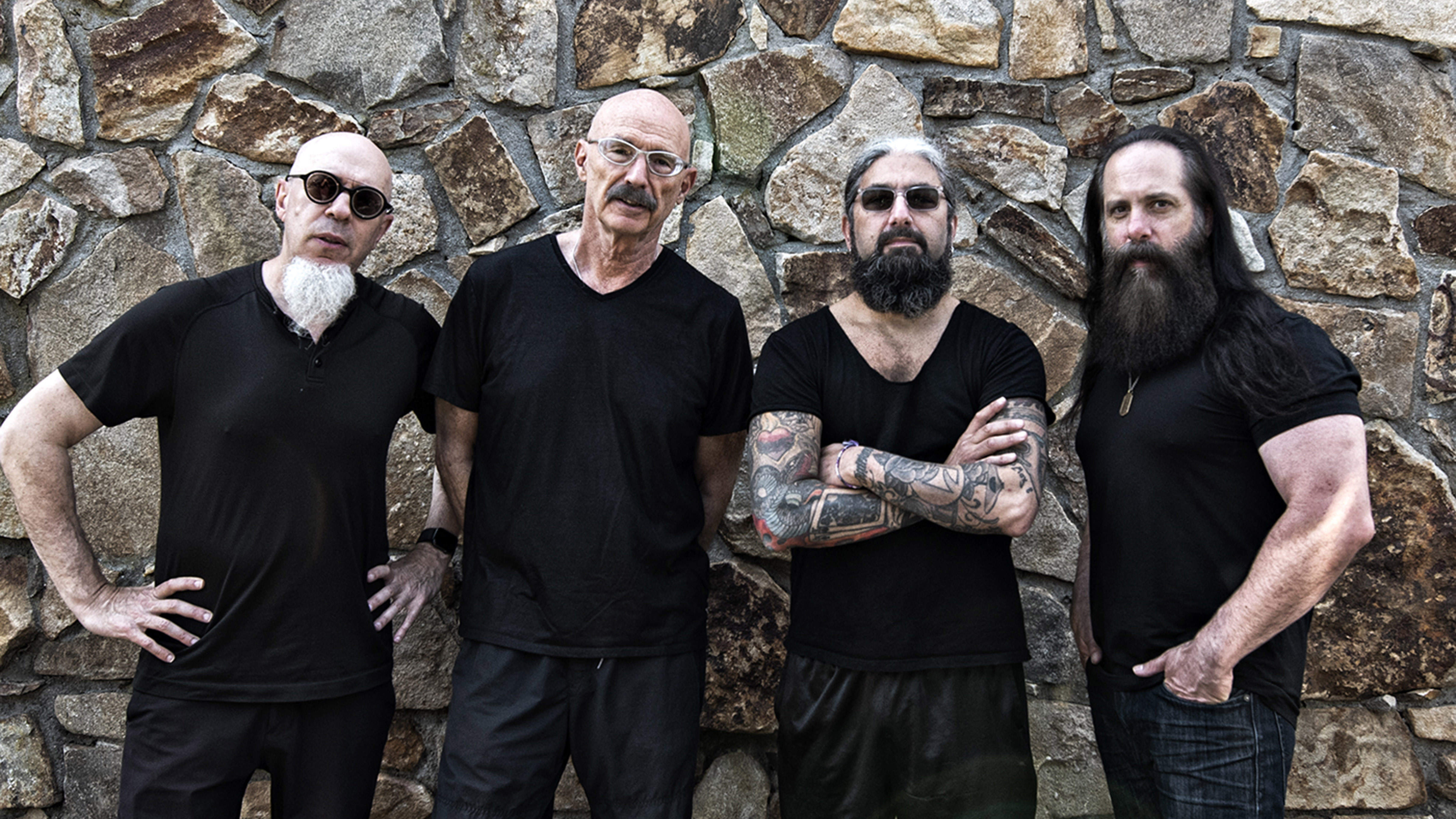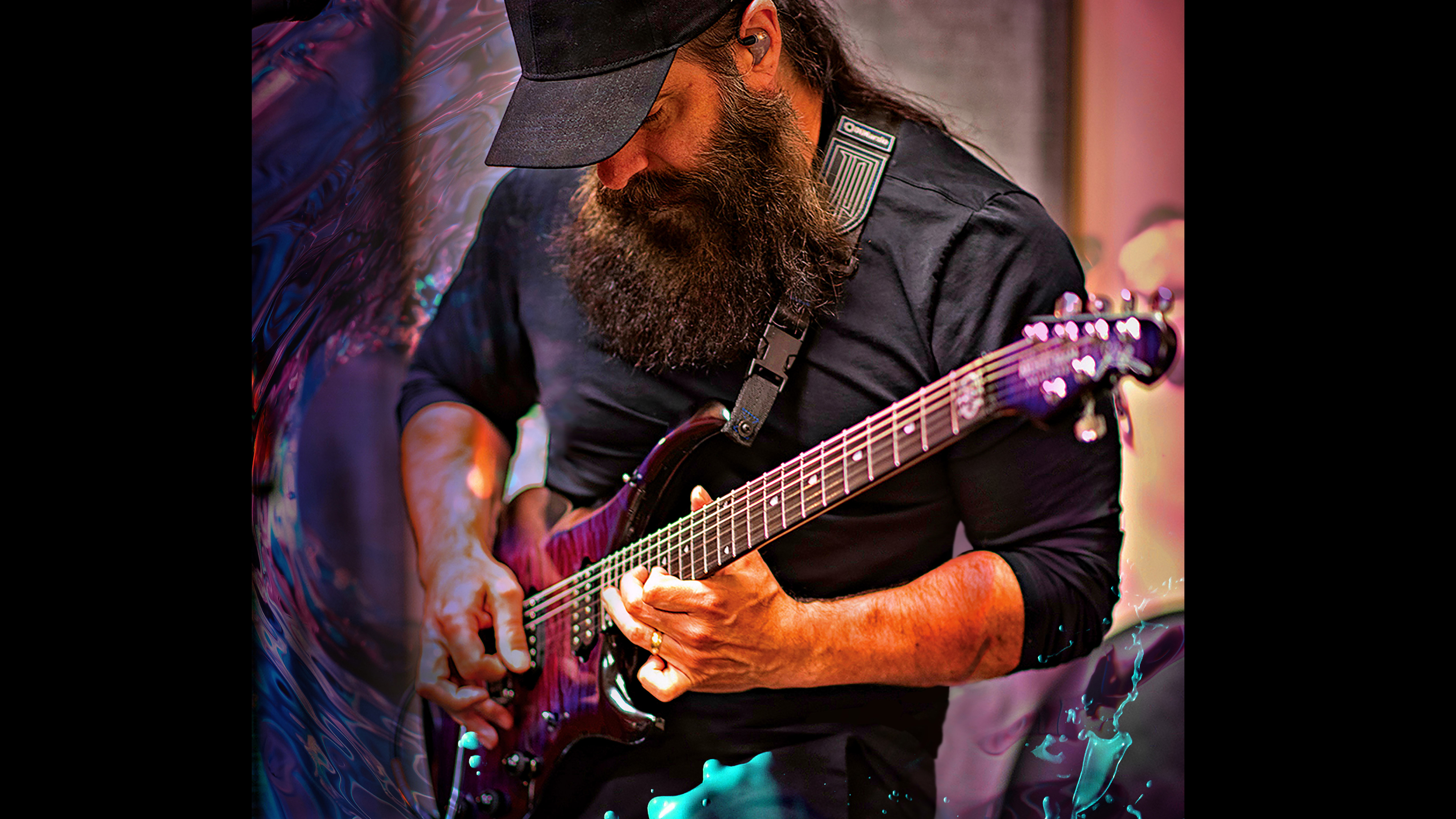John Petrucci: “I looked at it like a piano with more keys" – the prog icon talks 8-string guitar, Liquid Tension Experiment and the next Dream Theater album
Interview: the prog icon has had a very busy lockdown

Want all the hottest music and gear news, reviews, deals, features and more, direct to your inbox? Sign up here.
You are now subscribed
Your newsletter sign-up was successful
Few guitarists have been keeping as busy over lockdown as John Petrucci – recording and releasing his first solo album in 15 years, Terminal Velocity, only to carry on through into Liquid Tension Experiment’s third full-length, materialising a staggering 22 years on from its predecessor. When MusicRadar connects with him, he’s still in the studio, this time finishing up sessions for Dream Theater’s upcoming fifteenth album. We have to ask him – does he ever take a second to breathe?
“Oh my god, I know!” he laughs. “I’m so thankful I had this studio built and in working order for my solo album, then moving onto LTE and now the new Dream Theater. It’s very close to where I live. If I didn’t have this, I might be in a different place right now musically, it would have been a lot harder to complete all this music. It’s good to have a place to go where you can get stuff done.
“If this was just a home studio, I don’t know if I’d have been able to record these albums,” he continues, admitting “it would have been more difficult getting together safely with the LTE guys. So yeah, even though I’m basically living at this studio, having spent many long days here since March 2020, I’m very grateful for it!”

The solo album and Liquid Tension Experiment 3 saw you reunited with Mike Portnoy for the first time in a decade. It’s clear the chemistry between you and him remains very much intact…
“Absolutely. I’m so glad I asked him to do my solo album and he said yes. That experience was the first time we did anything musically together since he left Dream Theater. Albeit he was playing on a record that was done and written… I basically hired him to play drums on the album. We didn’t really write together, but it was such a great experience to connect musically and be in the same room. I’d watch him play and record him, and we’d play a little together too when we had a free moment.
“But mainly we were hanging out as friends and reconnecting musically. And that really set the stage for being able to do LTE. A couple of months later, we were back in that same studio and it was the same drum kit mic’d up and ready to go. Mike and I both knew it would sound good and work well.
“That was our first opportunity to really write together, be creative and jam. We got to spend some real musical time together and it was clear that the chemistry did not go away. It was naturally right there, right from the get-go. It made us very happy and I’ve seen from all the comments people have left that it’s made them happy too. That’s something we all need during these times, some positivity, good news and friendship. It’s infectious!”
Want all the hottest music and gear news, reviews, deals, features and more, direct to your inbox? Sign up here.
You can go from something super chaotic and angular to something really soaring and beautiful just at the drop of a dime
There are some really interesting tempo shifts on LTE3, like in Hypersonic where you switch to half-time before that really melodic guitar solo...
“What you’re talking about is the eclectic nature of LTE, we can do things that go from one extreme to the next. And somehow it works… somehow it’s musical and makes sense. Even though there are some really sharp turns on that journey, it really does take you for a ride.
“It reminds me of being on a really cool ride at an amusement park like Disneyworld, where it’s all crazy and suddenly you get shot into this slow motion space panoramic thing and the whole view changes. It reminds me of that. It’s a journey, it’s a ride and you don’t know what’s round the corner. You can go from something super chaotic and angular to something really soaring and beautiful just at the drop of a dime. I love that – it adds a lot of drama to the music.”
It definitely does! You do it again one and a half minutes into Beating The Odds, again really milking the notes on your leads...
“I look forward to those moments. It’s something I love to explore as a player. I find it so easy coming up with those parts with Jordan [Rudess, keyboards]. I noticed it immediately when he joined Dream Theater and we wrote Scenes From A Memory, which was the first album with him. After doing two LTE albums with him, having those beautiful chord progressions and melodic guitar moments, it carried into Dream Theater.
“There’s a lot of history of these big, epic soaring guitar moments over progressions – that became our style and a big part of our musical chemistry. Fast forward 22 years after the second LTE album, here we are again with even more experience from our years in Dream Theater together. It’s those moments where you are the guy on the mountaintop with your hair blowing in the wind and eagles flying around (laughs)! I love and cherish those moments, and I’m grateful that Jordan and I are able to do that together so easily.”
I always gravitated towards players like Neal Schon or David Gilmour, who could make their guitars sing in a way that leaves you crying as you listen to their beautiful melodies
You’ve always found the right balance between those moments and the speedier aspects of playing. Which musicians inspired that melodic side of you?
“I’ve always been into that side of it, as fun as the shred stuff is. I always gravitated towards players like Neal Schon or David Gilmour, who could make their guitars sing in a way that leaves you crying as you listen to their beautiful melodies. That’s a side in my playing I’ve always been trying to develop. I think I just got a little more used to doing it over time, but it’s always something I’ve been interested in.
“Think of it this way – you’re in this really boat, speeding along with this amazing adrenaline rush. It’s just as exciting when that boat slows down and you’re floating in the midst of a giant lake with beautiful scenery all around you, taking it all in. That is just as thrilling as the fast and exciting adrenaline moments. I know I’m giving you a lot of metaphors here [laughs]!”
Although people think differently, some musicians will count the same piece of music different, it can make sense in different ways from one player to the next
When it comes to building speed, you’ve spoken in the past about playing the same line against different divisions of the same pulse, in order to help find your weak spots. That must be a handy writing tool, as well…
“For sure. A lot of it can be syncopation and not having everything fall on the beat. You could use micro changes in the signature or syncopate it rhythmically and have things coming in on the up-beats. Or you could play through the beat, so your phrases don’t always end on the one, they don’t complete when the measure completes. They might go through the measure.
“Doing things like that can make your lines sound better and more interesting. It can start sounding a little – not basic, but perhaps boring – when everything is compartmentalised on the beat, with the ‘correct’ amount of groupings repeating. It sounds more interesting when you play through it and toy with things, mixing them up a bit.”
Which reminds us of Beating The Odds, funnily enough – which has a seven feel, counts of three alternating with counts of four…
“Absolutely. Different divisions like that is a way of being smart and that’s definitely something I use from time to time, as well as the musicians I’ve played with over the years. Although people think differently, some musicians will count the same piece of music different, it can make sense in different ways from one player to the next. Breaking things up into smaller groups, like taking a seven, and thinking of it as three then four, or four then three or five then two, can help you understand the phrasing and where the accenting is.”
Guthrie is unbelievable... in fact, he’s beyond phenomenal
Liquid Evolution seems to showcase your fusion side. Though you’re very different players, it could be the closest you’ve come to sounding like Guthrie Govan – is he someone you’ve ever listened to?
“Yeah, Guthrie is unbelievable... in fact, he’s beyond phenomenal. I had him at my Guitar Universe camp as a guest instructor. What a gifted, monstrous player. Guthrie really is one of a kind and genuinely born to play guitar. He can play so many styles so well… that guy is so talented.
"We did a bunch of things at the camp, he played some pieces as part of it and all of us were watching him in amazement with our jaws on the floor. Then we jammed together which was amazing. I didn’t attend his lessons because I was busy with my responsibilities but everyone said his clinics went amazingly, he’s such a great teacher and instructor. So yeah, he’s ridiculous. I have so much respect for him, he’s unbelievable.”
Both of you have been covered to death on media platforms like YouTube and Instagram. Where do you find players most going wrong when tackling your leads?
“First of all, I’m incredibly impressed by how much talent there is out there. You can easily find it all on YouTube and Instagram. It’s crazy how quickly players will learn a track I put out… sometimes within hours of it being released, playing it perfectly well and exact. Having said that, with some of this stuff, there are rhythmic aspects that are tricky. And sometimes if you don’t fully understand that, you might think the phrasing is in a certain way when it’s actually doing something different.
“So that’s sometimes where I hear discrepancies but honestly I can’t even say anything critical about people out there because there are so many talented players around, it’s mind-blowing to me. And I find it inspiring. I watch some of that stuff and think, ‘I gotta go practice… that person is playing my part better than me!’ I love it.”
We were just listening to Rush, Yes and Metallica and we got together to make this music that would eventually be labelled prog-metal. But it wasn’t really a thing back then
In that sense, it feels like progressive music has never been more popular than it is right now…
“It’s unbelievable, when you think about how much this genre has grown. Especially when I think back to when I started with Dream Theater and the guys. We were just listening to Rush, Yes and Metallica and we got together to make this music that would eventually be labelled prog-metal. But it wasn’t really a thing back then.
“There was us, Queensrÿche and Fates Warning maybe… and that was about it. Since then, that whole genre has grown beyond whatever I would have imagined. There are so many offshoots, incorporating metal in such different styles that are all considered prog and on the family tree, so it’s way huger than what it was 20 or 25 years ago.”

I used it on the new Dream Theater album for one song – or actually on a couple of tracks – but I wrote one song using it
We heard whispers of an eight-string Majesty signature guitar on the way, even making an appearance on the new Dream Theater…
“Yeah, it’s something that’s in development and that we’re still prototyping. And yeah, I used it on the new Dream Theater album for one song – or actually on a couple of tracks – but I wrote one song using it. And as for how I’m using it, instead of trying to mimic what I thought an eight-string should sound like, because of other bands who have used them in the past, I thought of it more like, ‘Okay, I’ve got one more string that’s lower extending the range of the guitar!’ and started asking myself what I could do riff-wise, chord-wise or solo-wise to extend what I’d naturally do on a six or seven-string.
“I looked at it like a piano with more keys. There are more options for bass notes, rather than approaching it from a stylistic standpoint. So I looked at it from more of a compositional aspect, from the mindset of having more choices to play a riff in this key and then extend the range down and go below where I’m normally able to go. And I had a lot of fun doing it!”
There was such a dramatic shift from The Astonishing to Distance Over Time. What can we expect next from Dream Theater?
“We’ll be getting into the details over the coming months but what I could say is that we started in October of last year. It was the same thing with LTE, because of the pandemic and everyone being at home, we were all so excited to see each other and get together to make music. Everyone came to play. So the music is happening, everyone was firing on all cylinders. There was a lot of excitement and energy. I’m very excited about this new music we’ve made together. Everybody brought their A-game, for sure!”
Liquid Tension Experiment 3 is out now on Inside Out Music. For more information visit johnpetrucci.com
Amit has been writing for titles like Total Guitar, MusicRadar and Guitar World for over a decade and counts Richie Kotzen, Guthrie Govan and Jeff Beck among his primary influences. He's interviewed everyone from Ozzy Osbourne and Lemmy to Slash and Jimmy Page, and once even traded solos with a member of Slayer on a track released internationally. As a session guitarist, he's played alongside members of Judas Priest and Uriah Heep in London ensemble Metalworks, as well as handling lead guitars for legends like Glen Matlock (Sex Pistols, The Faces) and Stu Hamm (Steve Vai, Joe Satriani, G3).
